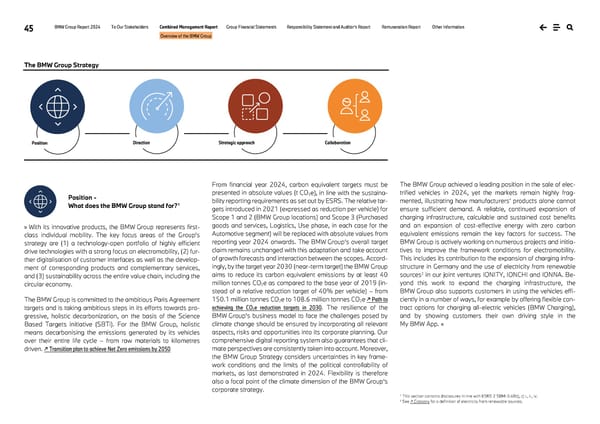45 BMW Group Report 2024 To Our Stakeholders Combined Management Report Group Financial Statements Responsibility Statement and Auditor’s Report Remuneration Report Other Information Overview of the BMW Group The BMW Group Strategy Position - What does the BMW Group stand for?1 » With its innovative products, the BMW Group represents first- class individual mobility. The key focus areas of the Group’s strategy are (1) a technology-open portfolio of highly efficient drive technologies with a strong focus on electromobility, (2) fur- ther digitalisation of customer interfaces as well as the develop- ment of corresponding products and complementary services, and (3) sustainability across the entire value chain, including the circular economy. The BMW Group is committed to the ambitious Paris Agreement targets and is taking ambitious steps in its efforts towards pro- gressive, holistic decarbonization, on the basis of the Science Based Targets initiative (SBTi). For the BMW Group, holistic means decarbonising the emissions generated by its vehicles over their entire life cycle – from raw materials to kilometres driven. ↗ Transition plan to achieve Net Zero emissions by 2050 From financial year 2024, carbon equivalent targets must be presented in absolute values (t CO2e), in line with the sustaina- bility reporting requirements as set out by ESRS. The relative tar- gets introduced in 2021 (expressed as reduction per vehicle) for Scope 1 and 2 (BMW Group locations) and Scope 3 (Purchased goods and services, Logistics, Use phase, in each case for the Automotive segment) will be replaced with absolute values from reporting year 2024 onwards. The BMW Group’s overall target claim remains unchanged with this adaptation and take account of growth forecasts and interaction between the scopes. Accord- ingly, by the target year 2030 (near-term target) the BMW Group aims to reduce its carbon equivalent emissions by at least 40 million tonnes CO2e as compared to the base year of 2019 (in- stead of a relative reduction target of 40% per vehicle) – from 150.1 million tonnes CO2e to 108.6 million tonnes CO2e ↗ Path to achieving the CO2e reduction targets in 2030. The resilience of the BMW Group’s business model to face the challenges posed by climate change should be ensured by incorporating all relevant aspects, risks and opportunities into its corporate planning. Our comprehensive digital reporting system also guarantees that cli- mate perspectives are consistently taken into account. Moreover, the BMW Group Strategy considers uncertainties in key frame- work conditions and the limits of the political controllability of markets, as last demonstrated in 2024. Flexibility is therefore also a focal point of the climate dimension of the BMW Group’s corporate strategy. The BMW Group achieved a leading position in the sale of elec- trified vehicles in 2024, yet the markets remain highly frag- mented, illustrating how manufacturers’ products alone cannot ensure sufficient demand. A reliable, continued expansion of charging infrastructure, calculable and sustained cost benefits and an expansion of cost-effective energy with zero carbon equivalent emissions remain the key factors for success. The BMW Group is actively working on numerous projects and initia- tives to improve the framework conditions for electromobility. This includes its contribution to the expansion of charging infra- structure in Germany and the use of electricity from renewable sources2 in our joint ventures IONITY, IONCHI and IONNA. Be- yond this work to expand the charging infrastructure, the BMW Group also supports customers in using the vehicles effi- ciently in a number of ways, for example by offering flexible con- tract options for charging all-electric vehicles (BMW Charging), and by showing customers their own driving style in the My BMW App. « 1 This section contains disclosures in line with ESRS 2 SBM-3.48b), c) i., ii., iv. 2 See ↗ Glossary for a definition of electricity from renewable sources. Strategic approach Position Direction Collaboration
 BMW Group Report 2024 Page 44 Page 46
BMW Group Report 2024 Page 44 Page 46